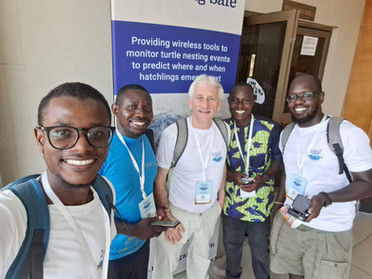The International Sea Turtle Symposium - A First on African Soil
- eve
- May 27, 2025
- 3 min read

The final week of March was a memorable one to me as I spent the most important days of Ramadhan in another country in Africa. As the Marine Megafauna Lead, I represented LaMCoT at the 43rd International Sea Turtle Symposium, which took place 22nd - 27th March 2025 at The Grand Mensvic Hotel, in Accra, Ghana.
The International Sea Turtle Symposium
This is the largest annual sea turtle lovers' event, organized by the International Sea Turtle Society (ISTS). The symposium brings together sea turtle enthusiasts, scientists, conservationists, managers, academics, advocates, indigenous groups and policy-makers to share insights, network, learn from each other and showcase their work to the globe.

For the first time since 1982, the symposium took place on African soil. This meant greater representation from the Africans compared to past years: about 310 participants from 58 different nations and 68 of the delegates were from Africa. From Kenya, I was in the company of conservationists from The OliveRidley Project, Bahari Hai, Diani Turtle Watch, and Pent Vet.
This holistic symposium, themed #UnityandCollaboration, was organized into three parts;
General meetings for all the delegates
Regional meetings for specific locations like the Africa, Mediterranean & Indian Ocean and South-East Asia (IOSEA)
Meetings based on specific topics, mainly Fisheries Threats to Sea Turtles, Socioeconomic and Cultural Studies, Nesting Biology, In-water Biology, Anatomy and Physiology, and Conservation, Management and Policy.
Intriguing Trends in Sea Turtle Conservation

The symposium was an eye-opener, especially on the different conservation approaches from other parts of the world. To mention a few, the following sea turtle conservation trends intrigued me:
Sea turtle awareness campaigns are conducted at night in Ghana, when families are home, including fishermen.
There is a floating sea turtle station in Tunisia, used for rehabilitation and tourism. I was most fascinated by their sensitization approach in community-led conservation by creating fishermen-biologists. Fishermen are educated in Biology, then trained and offered equipment to collect data used in monitoring Tunisia's fish stock decline and recovery, and assisting in sea turtle conservation.
In Guiana, data, especially socioeconomic, is collected informally. Data collectors go to their respondents and start chatting seamlessly, without questionnaires or any kind of structure. Back in the office, they extract useful information to attain what is important for their surveys. They have the liberty to go back to the respondents sometime later if they missed some important answers and this is more effective to them.
The revolutionizing of sea turtle monitoring technology also drew my attention, with the wireless Nesting Safe technology, which collects real-time in-situ environmental data of sea turtle nests as well as nesting beaches.
In Saudi Arabia, turtle populations have flourished due to the strict enforcement of policies in the Kingdom.
There is a thousand-fold increase in sea turtle nests in Cape Verde, with a record high of over 250,000 nests in 2024, thanks to effective conservation measures.
I was so motivated with the substantial research on these species in universities and research centers globally; from Australia, USA, Spain, Saudi Arabia, among others.
Moving Forward

While at the symposium, I made a presentation, titled; “Insights from over 30 Years of Sea Turtle Conservation in Lamu,” where I expounded more on the turtle nest protection work and bycatch release program LaMCoT has been conducting since its formation in 1992. As I am back in Lamu, this time with a global perspective of sea turtle conservation, I am motivated to employ the learnings gained from the symposium. As the saying goes, “If you want to conquer the world, start off by making your bed in the morning.”
I am currently in the planning stage of conducting training for our sea turtle patrollers. Funded by the Portuguese Embassy and Lamu Environment Foundation (LEF), we will cover the use of GPS, soil meters, temperature loggers and some basics on sea turtle biology and anatomy, so stay tuned.
Written by Mohamed Mohamed Yusuf
~ LaMCoT Megafauna Lead





























Comments